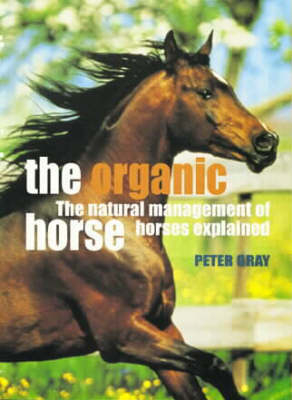
The Organic Horse
The Natural Management of Horses Explained
Seiten
2001
David & Charles (Verlag)
978-0-7153-0950-6 (ISBN)
David & Charles (Verlag)
978-0-7153-0950-6 (ISBN)
- Titel ist leider vergriffen;
keine Neuauflage - Artikel merken
Aims to answer horseowners' questions, such as: Should we try to keep contamination down rather than use potentially harmful drugs, even if these are not toxic to the horse?; what of the water and food our horses consume?; and can the influences of known toxins be ignored?
The "organic horse" is the horse designed by nature, free of defects that might arise as a result of poor management, or even environmental pollution. It is an ideal state, and something that should be aimed for. Many of the diseases which today affect our horses are either man-made or, at least, precipitated by factors over which we have some degree of control. The level of contagious disease reflects the failure to inderstand how infection is induced and spread, or to accommodate natural immunity. The question arises: are people better off trying to keep contamination down in the first place rather than using potentially harmful drugs to improve the situation, even if these are not toxic to the horse? And what of the water and food horses consume? Are nutritionists pressing nature too far? Can the influences of known toxins be ignored, even if they are only detected in tiny amounts? Can these trigger off low grade disease? This book aims to answer these questions.
The "organic horse" is the horse designed by nature, free of defects that might arise as a result of poor management, or even environmental pollution. It is an ideal state, and something that should be aimed for. Many of the diseases which today affect our horses are either man-made or, at least, precipitated by factors over which we have some degree of control. The level of contagious disease reflects the failure to inderstand how infection is induced and spread, or to accommodate natural immunity. The question arises: are people better off trying to keep contamination down in the first place rather than using potentially harmful drugs to improve the situation, even if these are not toxic to the horse? And what of the water and food horses consume? Are nutritionists pressing nature too far? Can the influences of known toxins be ignored, even if they are only detected in tiny amounts? Can these trigger off low grade disease? This book aims to answer these questions.
The horse in the wild and under field conditions; natural digestion; the organic ideal and food quality; feed additatives and supplements; contaminants; infection and its prevention; pasture management; water quality; the stable environment; allergens; breeding; developmental problems of foals and immature horses; the moving horse.
| Erscheint lt. Verlag | 26.1.2001 |
|---|---|
| Verlagsort | Newton Abbot |
| Sprache | englisch |
| Maße | 193 x 263 mm |
| Themenwelt | Sachbuch/Ratgeber ► Natur / Technik ► Tiere / Tierhaltung |
| Naturwissenschaften ► Biologie ► Ökologie / Naturschutz | |
| Veterinärmedizin ► Allgemein ► Tierernährung / Tierhaltung / Tierzucht | |
| Veterinärmedizin ► Pferd | |
| ISBN-10 | 0-7153-0950-1 / 0715309501 |
| ISBN-13 | 978-0-7153-0950-6 / 9780715309506 |
| Zustand | Neuware |
| Informationen gemäß Produktsicherheitsverordnung (GPSR) | |
| Haben Sie eine Frage zum Produkt? |
Mehr entdecken
aus dem Bereich
aus dem Bereich
Ein tierärztlicher Ratgeber
Buch | Softcover (2021)
Kynos (Verlag)
22,00 €
Diva, Macho, Teufelsbraten: 15 starke Charaktere - und was sie uns …
Buch | Hardcover (2024)
Piper (Verlag)
20,00 €


